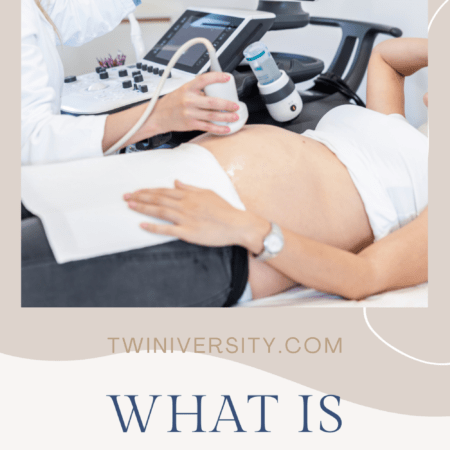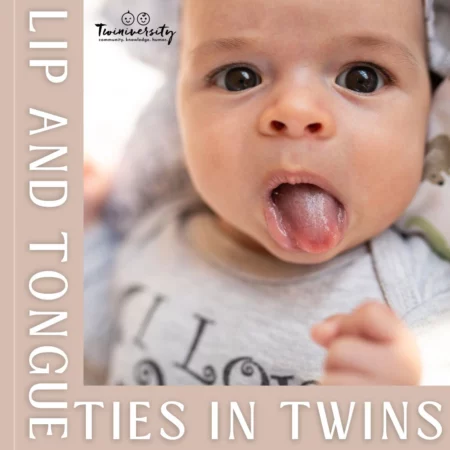Last updated on December 2nd, 2023 at 11:56 pm



Have you been told you’re suffering from vanishing twin syndrome? Get the answers to all of your questions here.
Learning you are suffering from vanishing twin syndrome is painful and confusing. With the swipe of an ultrasound wand, your world and pregnancy have changed forever. We’re here for you at Twiniversity. Read on to learn more about this rare complication of multiples pregnancy including how it happens, and, most importantly, why you are not to blame.
Disclaimer: All content on this website, including medical opinions and any other health-related information, is for informational purposes only and should not be considered to be a specific diagnosis or treatment plan for any individual situation. Use of this site and the information contained herein does not create a doctor-patient relationship. Always seek the direct advice of your own doctor in connection with any questions or issues you may have regarding your own health or the health of others.
What is Vanishing Twin Syndrome?
Vanishing twin syndrome occurs when a woman is confirmed to be carrying twins by ultrasound and then spontaneously loses one. At the next ultrasound, there is only a single baby. Essentially, one embryo stops developing and is absorbed by either the surviving twin, the placenta, or the mother. Vanishing twin syndrome can occur in twin, triplet, or higher-order multiples pregnancies.
First recognized in 1945 by Walter Stoeckel, this rare complication of multiples pregnancy is most commonly detected via ultrasound before week 12 of pregnancy. A vanishing twin is different from other twin prenatal complications in that it typically does not cause issues for the surviving twin.
It’s important to note that you must have confirmed a twin pregnancy in order to receive this diagnosis. Even if you had a feeling you might be carrying twins, an ultrasound confirming twins is required to classify your singleton pregnancy as vanishing twin syndrome. This is also not the same thing as losing one twin later on in pregnancy.
Need some baby safety training? Take the Twiniversity Complete Baby Safety course, offered on-demand. Includes video modules on infant, toddler, and child CPR, first aid, and common medical ailments, plus car seat installation and safety and childproofing your home. Click here to learn more!
What Causes a Twin to Vanish?
Vanishing twin syndrome is the spontaneous miscarriage of just one embryo, and as such, it is most likely caused by chromosomal complications. In contrast to a typical miscarriage, though, you are still pregnant after suffering from a vanishing twin miscarriage.
Nearly 50 percent of miscarriages are caused by chromosomal abnormalities, not by anything the parents have done. This is important to remember, as there is likely little you can do to prevent vanishing twin syndrome. As such, it’s important not to blame yourself.
Some research suggests that there may be an increase in vanishing twin syndrome due to procedures such as in vitro fertilization.
How Common is Vanishing Twin Syndrome?
The exact prevalence of Vanishing Twin Syndrome is challenging to determine because many cases go undetected, especially in pregnancies that are not closely monitored through ultrasound. Some estimates suggest that it occurs in 20% to 30% of multifetal pregnancies, but the actual prevalence may be higher since some cases go unnoticed.
Factors such as advancements in ultrasound technology and increased monitoring during pregnancy have contributed to the identification of more cases of Vanishing Twin Syndrome in recent years. As medical technology continues to advance, our understanding of the frequency and causes of this phenomenon may become more accurate.
How Is a Vanishing Twin Diagnosed?
Before ultrasounds, it was possible to diagnose vanishing twin syndrome through an examination of the placenta. Nowadays, vanishing twin syndrome is most commonly diagnosed through two separate ultrasounds. The first, usually completed around weeks 7-8 of pregnancy, shows two (or more) distinct fetuses, indicating twins or multiples. The second ultrasound, or heartbeat Doppler, typically taking place around 12-15 weeks, shows only one embryo.

Are There Any Symptoms to Watch For?
The only way to know if you are suffering from this type of loss is through an ultrasound. Most commonly, a sudden decrease in hCG levels detected in a blood test will prompt your provider to follow up with an ultrasound to confirm a vanishing twin. That said, there are a few symptoms that you should report to your doctor for closer examination. If you experience bleeding, uterine cramps, a sudden decrease in pregnancy symptoms, or pelvic pain you should contact your healthcare provider.
Do you Bleed with Vanishing Twin Syndrome?
Bleeding is not always a symptom of Vanishing Twin Syndrome, and the occurrence of bleeding can vary from case to case. In some instances, a woman may experience vaginal bleeding or spotting when one of the embryos is absorbed or miscarried, but it’s not a universal symptom.
Keep in mind that bleeding during pregnancy can have various causes, and it doesn’t necessarily indicate Vanishing Twin Syndrome. If you’re pregnant and experiencing bleeding or spotting, it’s essential to consult with a healthcare professional for a proper evaluation and diagnosis. They can conduct examinations, such as ultrasound scans, to assess the well-being of the pregnancy and identify any potential issues.
What are the possible consequences of Vanishing Twin Syndrome?
There are rarely consequences as a result of vanishing twin syndrome for the surviving twin or the mother. That said, one critical consequence can be the mothers’ mental health after losing one twin. Self-care will be critical in dealing with feelings of sadness, guilt, and anger in the months following the diagnosis. Be aware of any signs of depression or increased anxiety after a vanishing twin loss and be sure to seek professional help.
Vanishing twin can also cause a unique feeling of guilt during the rest of the pregnancy. After a miscarriage of just one twin, you may feel the typical feelings of sadness and anger. However, it is completely normal to have feelings of relief and excitement for the surviving twin. It is absolutely vital that mothers who are dealing with this news find support. Expecting moms should surround themselves with those who will honor their grief while holding space for the happiness of the new baby.
In the case of a later loss of a twin that is not absorbed, close monitoring and ultrasounds may be recommended to keep an eye on the remaining fetus. Some studies suggest that there may be a slight increase in risk for low birth weight and/or preterm birth for the remaining baby. There is also an increased risk of cerebral palsy on the surviving twin in the case of a loss later in the pregnancy. The good news is that there is only about a 3% chance of losing a twin after your 20th week.
Are you looking for the best double stroller for twins? Not sure if you should go for a tandem stroller or a side-by-side stroller? And what about a Snap N’ Go? We’ve got all the details for you in our double stroller resource. Click here to learn more… and while you’re at it, check out our expecting twins classes and the Twiniversity shop!
How Is This Different From Parasitic Twin Syndrome?
While vanishing twins can occur in any type of twin or multiples pregnancy, it is very different from parasitic twin syndrome A rare complication of identical twin pregnancy, parasitic twins occur when two identical twin embryos begin to develop but never fully separate. If the pregnancy remains healthy, this results in conjoined twins.
When one of these twins spontaneously stops developing, the tissue can attach to the dominant twin, causing parasitic twins. The parasitic twin cannot survive on its own. Sometimes, the strain of “carrying” said parasitic twin may cause severe and serious health problems for the viable twin. This may cause the surviving twin to be born with extra limbs or a mass of tissue where the sibling was. This is very different from vanishing twins and may cause complications for the surviving twin.
Will a Vanishing Twin Affect My Future Fertility?
There is little research to suggest a connection between vanishing twin syndrome and infertility. That said, if you are having fertility issues, whether you have suffered a loss or not, you should consult with your doctor to see if there might be an underlying cause. If you are struggling to conceive or carry a baby to term following a twin pregnancy that resulted in vanishing twin syndrome, it won’t hurt to mention it to your doctor. Many times, the level of concern will depend on the reason for your loss.

How Can I Cope With the Miscarriage of One Twin?
Pregnancy loss is difficult and it’s completely normal to feel grief and sadness. While you may feel “lucky” to still have one or more babies on the way, that might not lessen your pain. Try to remember that the cause of vanishing twin syndrome is never the mother. Consider keeping a journal of your feelings and emotions and allow yourself to grieve. Many parents choose to honor their lost twin.
If you have experienced vanishing twin in the past or are currently experiencing it, talk to your doctor about any concerns you may have about your chances for future pregnancies and children. Consider joining a pregnancy support group and sharing your experience.
Are There Any Treatment Options for Vanishing Twins?
A vanishing twin miscarriage typically happens during the first trimester and as a result, there is no treatment. The pregnancy will continue as a single pregnancy. Most often, in these cases, the fetus will be absorbed into the placenta and the unaffected baby will grow normally.
While you can’t treat or prevent miscarriages, try to focus on having the healthiest pregnancy for your surviving twin. Be sure to eat a healthy diet, get as much exercise as you can, and completely avoid tobacco, alcohol, and drugs.
How Can I Prevent This From Happening in Future Pregnancies?
A healthy diet, and getting enough sleep and movement can help maintain a healthy twin pregnancy, but there is little you can do to prevent vanishing twin. That said, proper medical care is the first step to avoiding many pregnancy complications. It is important for all pregnant women to find a doctor that they trust to manage their medical care.

The Bottom Line: It’s Not Your Fault
Pregnancy loss is difficult no matter what, and the loss of one of your twins or multiples can add guilt on top of the sadness. Know that you are not alone and it is not your fault that this happened. Speak to your doctor and seek out resources to help you cope. But mostly, try to focus your energy on your baby and having a safe and healthy pregnancy. And remember, once a twin mom, always a twin mom.












